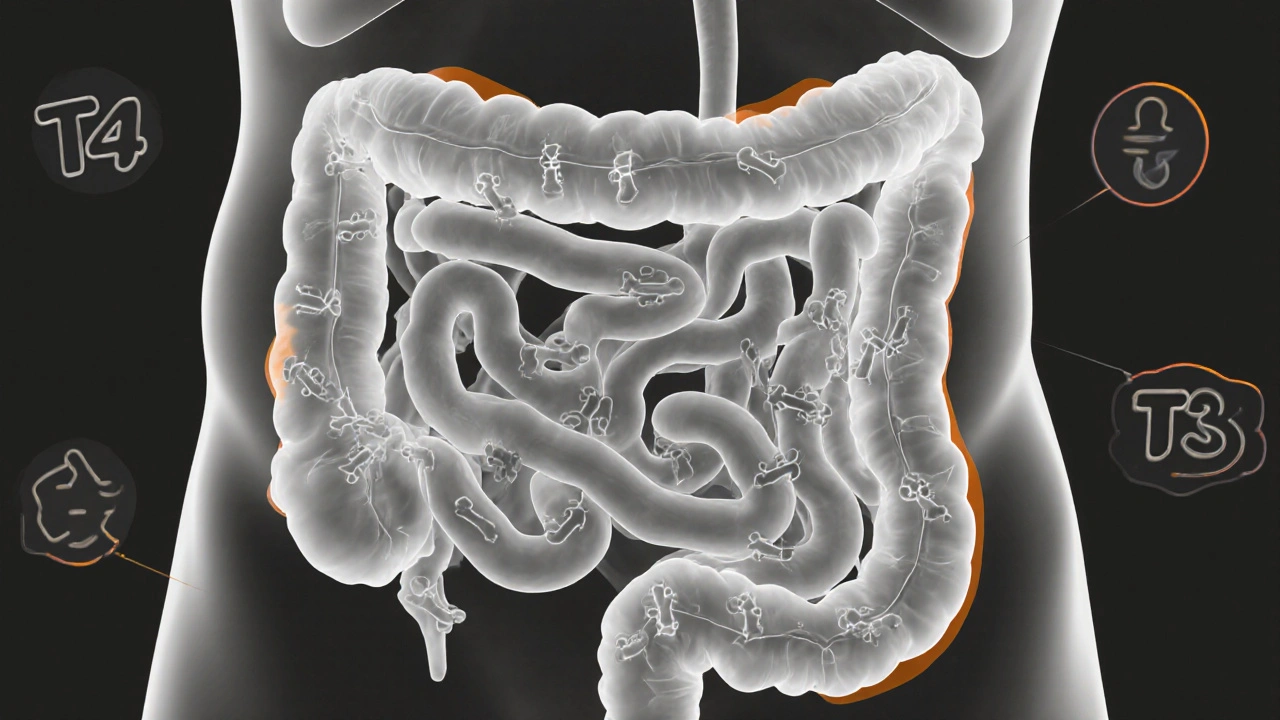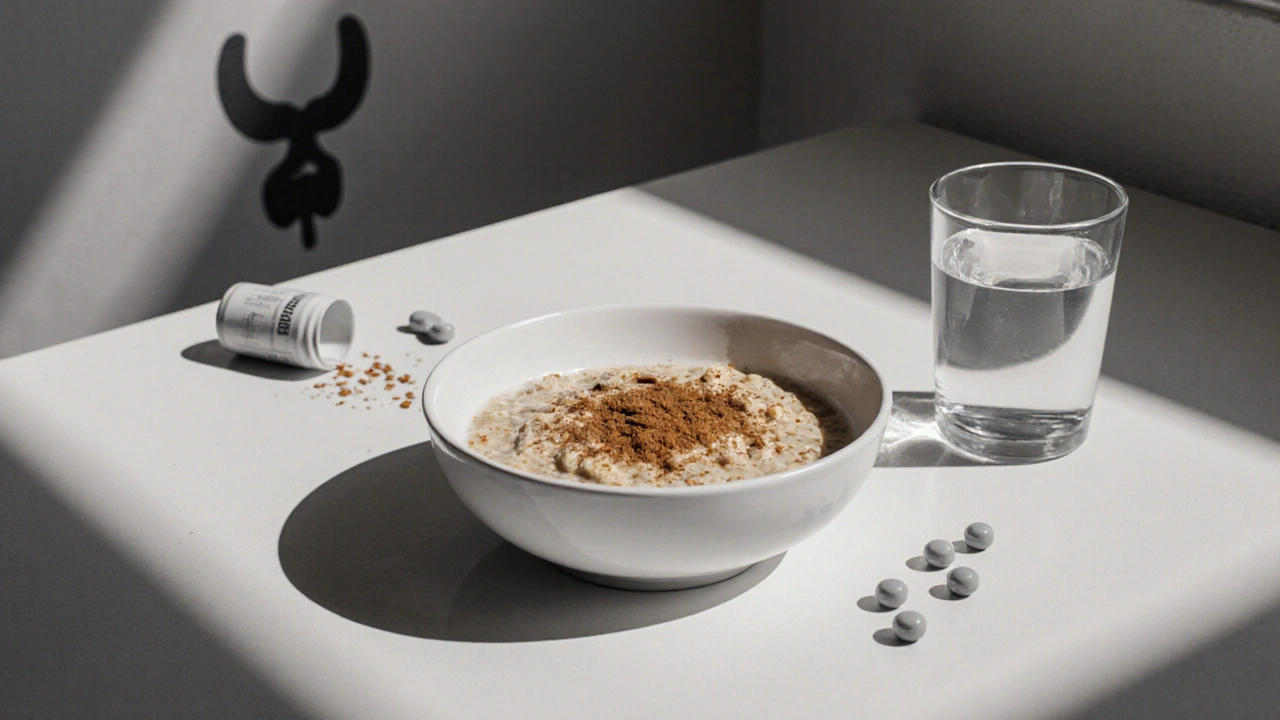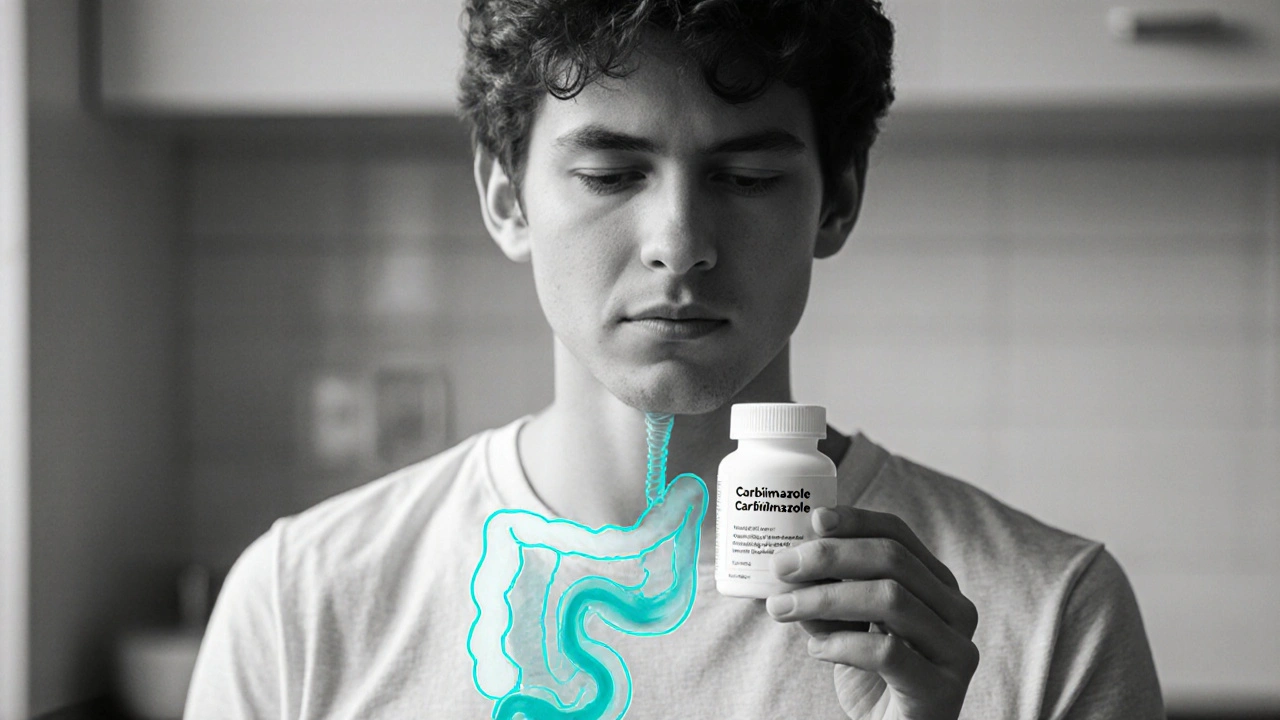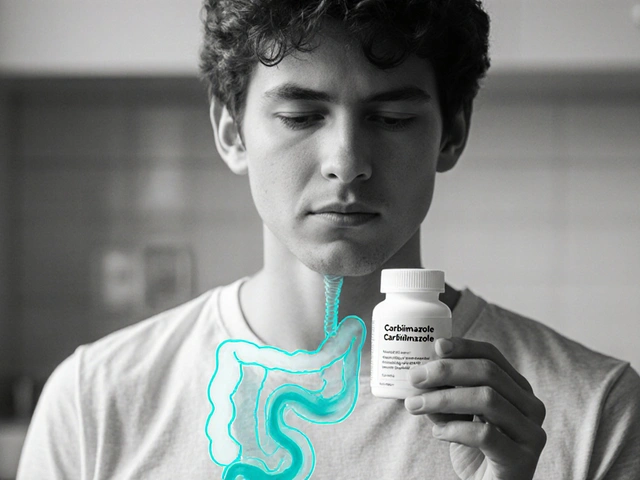Carbimazole vs PTU Side Effect Comparator
Understanding GI Side Effects
This tool compares the gastrointestinal side effects of carbimazole versus propylthiouracil (PTU), two common antithyroid medications. Use this to better understand your treatment options and when to contact your doctor.
Gastrointestinal Side Effect Comparison
| Side Effect | Carbimazole | Propylthiouracil (PTU) | Risk Level |
|---|---|---|---|
| Nausea | 10-15% | 15-20% | |
| Abdominal pain | 8-12% | 12-18% | |
| Diarrhea | 5-8% | 6-10% | |
| Constipation | 7-10% | 5-9% | |
| Rash with GI upset | Rare | Rare | |
| Severe diarrhea | Less common | Less common | |
| Weight loss | Occasional | Occasional |
Symptom Tracker
Select symptoms you're experiencing to see their frequency and when to contact your doctor.
Important Information
When to contact your doctor:
- Severe or bloody diarrhea lasting more than 48 hours
- Sudden unexplained weight loss exceeding 5% of body weight
- Persistent vomiting preventing oral intake
- Signs of infection such as fever with GI symptoms
- Signs of agranulocytosis (fever, sore throat, mouth ulcers)
Always maintain a symptom diary to share with your healthcare provider. This helps identify patterns and determine whether adjustments to your medication are needed.
Key Takeaways
- Carbimazole can change gut motility by altering thyroid hormone levels.
- Common digestive complaints include nausea, abdominal pain, and altered bowel habits.
- Supporting the microbiome with fiber and probiotics often reduces symptom severity.
- Serious symptoms such as persistent diarrhea or weight loss warrant a doctor’s review.
- Comparing Carbimazole with other antithyroid drugs helps you choose the best gut‑friendly option.
Ever wondered why a medication that targets the thyroid could leave you feeling queasy or constipated? You’re not alone. Carbimazole is a frontline antithyroid drug used to manage hyper‑thyroidism, yet many patients report unexpected digestion issues. This article unpacks the science behind the gut‑thyroid link, shows you what to watch for, and offers practical steps to keep your stomach happy while staying on treatment.
How Thyroid Hormones Influence Digestion
The thyroid gland produces thyroxine (T4) and triiodothyronine (T3), hormones that regulate metabolism in virtually every cell. In the gut, these hormones control muscular contractions (peristalsis), secretory activity, and the balance of gut‑derived hormones like motilin.
When thyroid levels swing high (hyper‑thyroidism), the gut speeds up - you may experience frequent bowel movements, abdominal cramping, or even diarrhea. Conversely, low thyroid function (hypothyroidism) slows everything down, often leading to constipation and bloating. Because thyroid function sits at the heart of gut motility, any drug that modifies hormone output can unintentionally tilt the digestive balance.
What Is Carbimazole?
Carbimazole is a synthetic thionamide that blocks the thyroid’s ability to convert iodine into active hormones. It’s most commonly prescribed for Graves’ disease and toxic nodular goitre. Typical doses range from 10mg to 40mg daily, adjusted based on blood tests that track free T4 and TSH levels.
Unlike its older counterpart propylthiouracil (PTU), carbimazole is usually better tolerated, but it still carries a profile of gastrointestinal (GI) side effects that can catch patients off guard.
Carbimazole’s Direct and Indirect Effects on the Gut
Two main pathways explain why carbimazole may bother your stomach:
- Hormonal shift: By lowering circulating T4/T3, carbimazole can slow gut motility, especially in the first weeks of therapy when hormone levels drop rapidly.
- Microbiome disruption: Emerging research links antithyroid drugs to changes in gut microbiota. A study from the University of Melbourne (2023) showed a modest reduction in Lactobacillus species after eight weeks on carbimazole, correlating with increased reports of bloating.
Both mechanisms are dose‑dependent. Higher doses tend to produce more pronounced GI symptoms, while low‑dose regimens often go unnoticed.

Spotting the Warning Signs
Not every stomach ache means carbimazole is the culprit, but certain patterns are worth noting:
- Persistent nausea or loss of appetite for more than two weeks after starting or adjusting the dose.
- Abdominal pain that improves when you lie down or after meals.
- Changes in stool frequency: new‑onset diarrhea or a slowdown leading to constipation.
- Unexplained weight loss despite stable appetite - could signal excessive hormone suppression.
- Skin rashes accompanied by GI upset - a possible allergic reaction requiring immediate medical attention.
If any of these symptoms become severe or last beyond a month, contact your endocrinologist. Early intervention can prevent dehydration, electrolyte imbalances, or the need to switch medication.
Strategies to Keep Your Gut Happy
Good gut health isn’t a magic pill; it’s about steady, supportive habits. Here are evidence‑backed steps you can adopt while on carbimazole:
- Fiber first: Aim for 25‑30g of soluble fiber daily - oats, apples, and psyllium are gentle on the stomach.
- Probiotic boost: Choose a multi‑strain product containing Lactobacillus and Bifidobacterium. A 2022 randomized trial found a 30% reduction in carbimazole‑related bloating when participants took 10billion CFU daily for six weeks.
- Stay hydrated: Water helps fiber move through the intestines. Aim for at least 2L a day, more if you’re experiencing diarrhea.
- Meal timing: Take carbimazole with a small snack, not on an empty stomach, to lessen nausea.
- Avoid irritants: Limit caffeine, alcohol, and very spicy foods until you know how your gut reacts.
- Regular monitoring: Blood tests every 4-6weeks during dose changes help you keep hormone levels in the target range, indirectly reducing gut upset.
When to Call the Doctor
Most side effects are mild and manageable, but certain red flags require prompt evaluation:
- Severe or bloody diarrhea lasting more than 48hours.
- Sudden, unexplained weight loss exceeding 5% of body weight.
- Persistent vomiting that prevents oral intake.
- Signs of infection such as fever combined with GI symptoms - could indicate agranulocytosis, a rare but serious carbimazole complication.
Bring a symptom diary to your appointment. Recording when symptoms start, their intensity, and any dietary changes makes it easier for your clinician to adjust the dose or consider an alternative drug.

Carbimazole vs. Propylthiouracil: GI Side‑Effect Comparison
| Side‑Effect | Carbimazole | Propylthiouracil (PTU) |
|---|---|---|
| Nausea | 10‑15% of patients | 15‑20% |
| Abdominal pain | 8‑12% | 12‑18% |
| Diarrhea | 5‑8% | 6‑10% |
| Constipation | 7‑10% | 5‑9% |
| Rash with GI upset | Rare (<1%) | Rare (<1%) |
Both drugs share a similar GI profile, but carbimazole tends to cause slightly fewer episodes of severe nausea. Your doctor may choose PTU for specific cases (e.g., pregnancy), but it’s worth discussing gut tolerance when making the decision.
Putting It All Together
Understanding the link between carbimazole and gut health empowers you to act before discomfort turns into a bigger problem. By monitoring symptoms, supporting your microbiome, and staying in close contact with your healthcare team, you can keep thyroid levels under control without sacrificing digestive comfort.
Frequently Asked Questions
Can carbimazole cause permanent gut damage?
No. Most GI side‑effects are reversible once the dose stabilises or the medication is discontinued. Persistent problems usually stem from unrelated conditions, so a thorough evaluation is essential.
Should I take probiotics before or after carbimazole?
Take probiotics with a meal, many hours after your carbimazole dose. This timing lowers the chance of stomach acidity destroying the beneficial bacteria.
Is it safe to combine carbimazole with laxatives?
Only under medical advice. Some over‑the‑counter laxatives can interfere with absorption of the drug, potentially altering thyroid control.
Why do I feel nauseous after the first week of treatment?
The initial drop in thyroid hormones can slow gastric emptying, leading to a feeling of fullness or nausea. Usually, the stomach adapts within a few weeks.
Can diet alone control my thyroid symptoms while on carbimazole?
Diet supports gut comfort but cannot replace medication. A balanced diet helps prevent secondary issues, yet regular blood tests and proper dosing remain key to managing hyper‑thyroidism.







Post A Comment